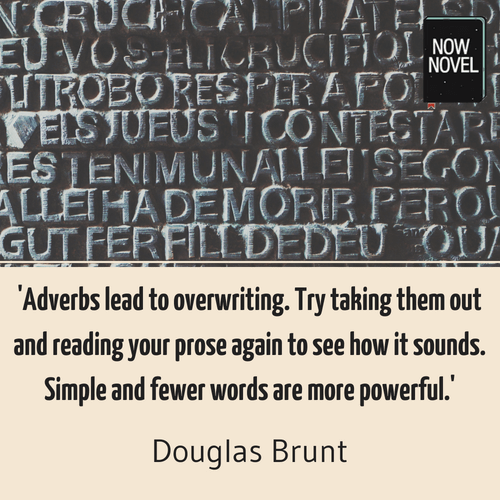Sayings such as ‘the road to hell is paved with adverbs’ scare many aspiring authors off using adverbs to describe characters’ actions. Yet writers say this because there are often more descriptive, common verbs you could use instead of a duller verb-plus-adverb. Use this list of descriptive strong verbs to create stronger mood, atmosphere, and characterization.
1. Verbs that describe movement
Common verbs that describe the ways your characters move (such as ‘run’, ‘sit’ and ‘walk’) have many vibrant alternatives. Explore these alternatives:
Powerful verbs for walking
‘She walked over’ is perfectly adequate to describe a character approaching. However, here are some alternatives for creating a vivid picture::
- To saunter:Use to describe a character who is laid back or relaxed. It means ‘to walk in a slow or relaxed manner.’ Example: She sauntered over to our cafeteria table, casually tossing her books onto one of the grimy seats.
- To stumble: A great alternative to walking, for uneven terrain, injury, or a clumsy character. Example: I stumbled on in the dark undergrowth, hoping to see the town’s lights winking ahead soon.
- To stride:Use for purposeful or confident walking. For example: She strode over the plain, sword aloft, deflecting incoming arrows as easily as summer gnats.
- To creep:Use for fearful or cautious movement. For example: He crept towards the display case, his eyes widening at the dazzling gold and rubies that sparkled and blinded.
- To hurry: You can also use words that describe general manner of movement, like this. For example: Late for class, she hurries, forgetting behind the paper she needs to hand in today.

Descriptive verbs for running
‘He ran for the departing train’ is another use of an adequate but not particularly descriptive verb. Here are exciting verb alternatives for ‘to run’:
- To bolt: This synonym for ‘run’ has connotations of fear (we typically speak of a frightened horse or other animal as ‘bolting’). For example: At the first firecracker’s bang, the dogs bolted, Tess careening into the sliding door with a loud whimper.
- To tear down/along: This carries a sense of violence or destructive movement (because we also use it to mean ‘to demolish’). For example: The thief tore down the side street, knocking a crate of fresh fruit from a startled merchant’s arms as he passed.
- To dash: This alternative word for run suggests nimble, smooth and precise movement. For example: When she realized she’d forgotten her handbag, she dashed back to the checkout counter.
- To hurtle: A great synonym suggesting impending impact (usually ‘hurtled towards’). For example: The athletes hurtled towards the tape across the finish line, each striving their hardest to break it first.
- To fly: Metaphorical uses of synonyms (a character might not literally be airborne) are also useful synonyms. For example: She flew along the track, certain she’d beat her record by whole seconds.
Level Up Your Description
Get our guide to writing character description, including a workbook with exercises and video lessons.
LEARN MORE
2. Verbs that describe stillness
Even when a character isn’t moving a lot can be going on. Instead of ‘they sat’, you could use a verb that describes characters’ mental or emotional states and other qualities.
Read these livelier words for motionless states:
Descriptive verbs for sitting
- To slouch: A useful word to convey a character’s laziness, bad posture or a defeated, ‘weighed down’ quality. For example: She slouched in the back row, staring out the window not giving a single crap what the teacher was on about.
- To slump over: A great expression to suggest an awkward resting pose the character has no control over (for example because asleep, or even deceased). For example: In the middle of the meeting she slumped over without warning as loud, embarrassing snoring reverberated across the shocked boardroom.
- To plonk [down]: Words that sound like the actions they describe (called ‘onomatopoeia’) are also useful for adding variety and life to your writing. For example: He plonked himself down on the couch, swigging back beer with his eyes closed as if wishing the world away.
- To perch: This is another great word that can be used for humorous effect. It suggests a bird on a bough – there’s a sense of being ready to spring off again at any moment. For example: “I need to go perch,” she said, and Emma groaned, wishing her mother wouldn’t describe going to the toilet in such foul and vivid way in front of her friends.
- To settle: This is a good word to use to show a character intends to stay put where they are. For example: He settled into the comfiest chair in the room, despite her having reserved it with a scarf. Seeing her irritated expression he gave a taunting wink.
Describing verbs for standing
Even when a person (or object) stands, you can invest this not-very-active action with tone and mood.
- To tower: A great word for imposing, awe-inspiring or terrifying height. For example: The palace towered over the peasants’ hovels. They muttered among themselves of cakes, coats of gold brocade and other luxuries they imagined gliding down gilded corridors.
- To pose: A good substitute for ‘standing’ when you want to suggest self-awareness or performance. For example: The actress posed at the meet and greet, plastering the same rehearsed smile across her face each time a flash went off.
- To rise: You can invest tall, immovable objects with a sense of movement – the movement a character’s eyes would make taking it all in. For example: The great mountain rose over the plains, casting deep shadows across the travellers’ long and dusty way.
- To protrude: A good synonym for ‘to stand’, suggesting ‘sticking out’. For example: Her head protruded above all the other guests and she felt ostrich-like, regretting the 6-inch heels.
- To jut: A word to suggest something that stands out in a way that breaks an otherwise even surface. For example: His hand jutted above the heads of the audience. He was burning to ask the speaker a sly – some would say trolling – question.
3. More vivid verbs for voice
Actions involving the voice – speech and laughter – also have many descriptive alternatives (for alternative dialogue tags specifically, see this blog post).
Synonyms for ‘to speak’
- To prattle: A great word when you want to convey that a character talks a lot but says very little of value or interest. For example: She prattled on, not even noticing as the other guests moved closer to the fireplace or inched out the door in search of two-way conversations.
- To preach: Words from professions (such as priesthood) used metaphorically are also great alternatives. Such as when a character is being holier-than-thou in dialogue. For example: The longer she preached, the heavier Emma’s eyelids became. Mid-way through a sermon on the dangers of boys who drive red convertibles, she woke with a start as her mother, still talking, shook her violently by the shoulders. [As you can see here, the occasional ‘-ly’ adverb is not the end of the world.]
- To whisper: Synonyms for ‘to talk’ like these are excellent for creating volume and mood. For example: The closer they got to the abandoned house, the softer her brother whispered his protests, until she spun around, eyes flashing. “Either shut up or speak up.”
- To drawl: Words such as ‘drawl’ are great for characterization. It means ‘to speak in a slow, lazy way with prolonged vowel sounds.’ For example: The sleaze-bag looked her up and down as he drawled. “Pretty thing like you shouldn’t ever break down on a quiet road like this.”
- To stammer/stutter: Even though their causes aren’t necessarily nervous, speech impediments are useful for conveying faltering speech in a tense or anxious situation. For example: “I d-didn’t even t-touch-:” (he swallowed) “anything here.” The shop assistant glared down at the smashed glass.

Verbs for laughter and joking
Here are words to use instead of ‘to laugh’:
- To guffaw: This synonym for ‘laugh’ conveys a sense of raucous, uninhibited laughter. For example: He slapped his knee and guffawed when the groom tripped over the stairs to the altar, but quickly disguised his outburst as a cough when he caught his wife’s warning glare.
- To giggle: A great word for suppressed or youthful laughter. For example: Their friends were camping two meters away so she giggled and covered his face with her hand as he started unbuckling, saying risque things in that dumb pirate voice he loved to put on.
- To chuckle: This synonym for ‘to laugh’ conveys affection or an easy-going nature, and is also a good option for characterizing. For example: He didn’t find her joke funny but he chuckled as naturally as he could, hoping she couldn’t tell.
- To be hysterical: This synonym is great for conveying intense mirth. For example: The more they tried to keep it together, the more hysterical they became, until their faces were crimson and they burst out shrieking, causing Mr Howard to spin around from the blackboard and exile them to the Headmaster’s office.
- To snicker: Another useful laughter substitute, this time with an undertone of mockery. For example: ”Oh, Mister ‘I don’t care if I get a D for woodwork’ is making a tree-house this summer? Good luck!” She snickered as she got off the school bus.
What are some of your favourite descriptive verbs? Feel free to share them in the comments section. And if you’re starting out as a writer, invest in a good thesaurus that will help you find the best verbs for any context.
Join Now Novel to get constructive feedback on your writing or work one-on-one with a coach to stay on track and finish your current project.


8 replies on “Descriptive verb list: 30 words to replace dull actions”
Lol, in today’s easily offended world, where any little thing that can be taken wrong is, I think ‘snicker’ might draw fewer raised eyebrows. Just my opinion.
Good point! The offensive potential of the word wasn’t immediately apparent as the offensive version isn’t one used much outside the US. A good reminder of regionalism, that’s been changed. Thanks for reading.
Of course, the intent and attitude toward “today’s easily offended,” is evident no matter which word is used.
How in the world would “snicker” be offensive?
Hi Desdemona’s bane, the word being referred to was ‘snigger’ which is not offensive in non-US contexts where a certain horrible racist epithet contained in the word isn’t as common. Of course ‘snigger’ is actually a variant of ‘snicker’ in origin, but OP was saying that people could take offence at the closeness of the two words in sound and letters. I hope this clarifies 🙂
Good tips. It’s like finding out there are more than the five-pack of Crayolas.
Jordan, while I understand we live in a supercharged politically correct society, the two words are spelled and pronounced differently. If one has cause to doubt the meaning of the word, look at the preceding words or afterwords. They should reveal the writer’s intention. Don’t you think?
Hi BKjerry, you wouldn’t be at fault to use the word, I would say, no. It is quite clearly not the same word.
However it is perhaps better to be safe on account of the sensitivity of some than offend more people than necessary (if a close alternative is an identical substitution in terms of semantics). One can read for context, but in the era of the internet and the soundbyte (and the social media battalion), people do also love to take things out of context.